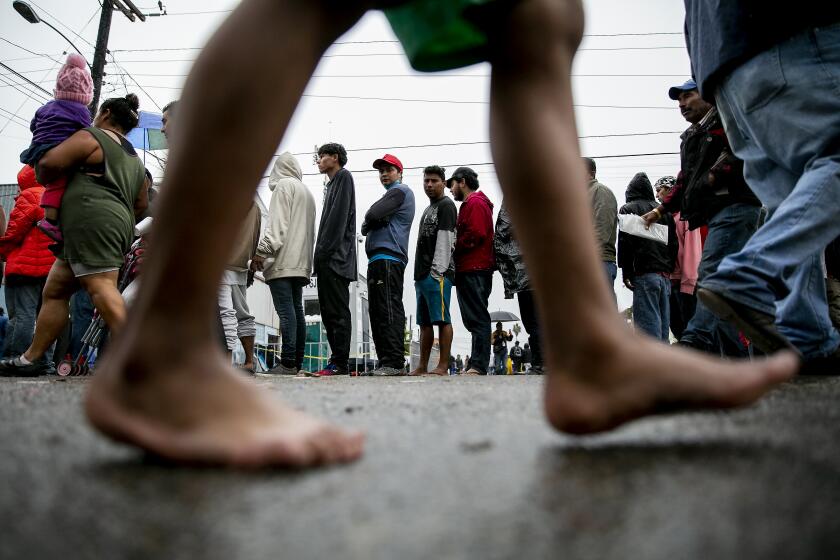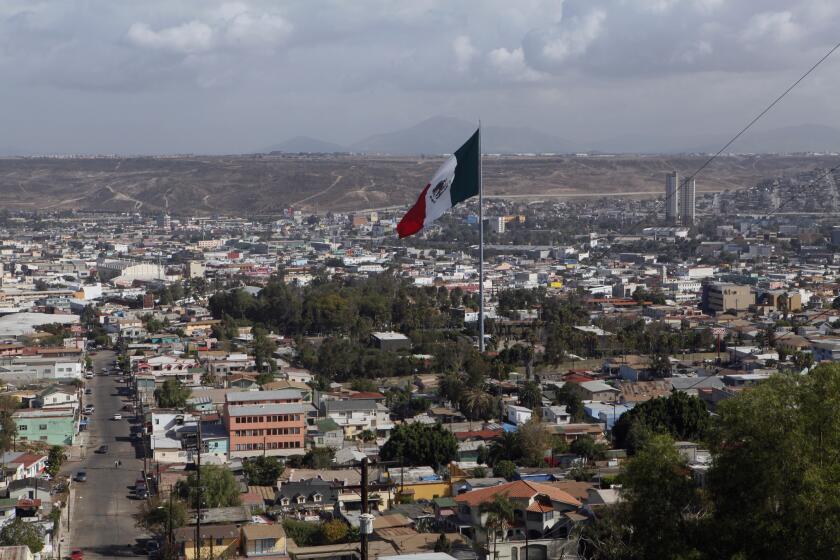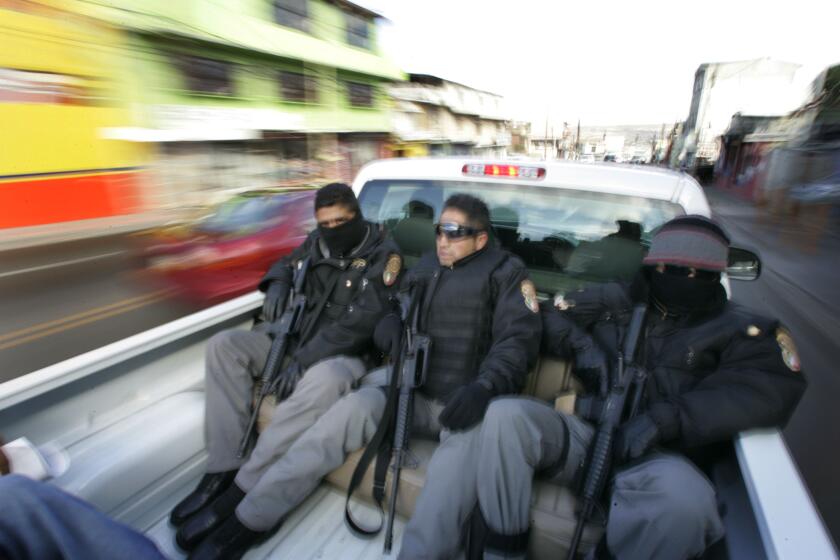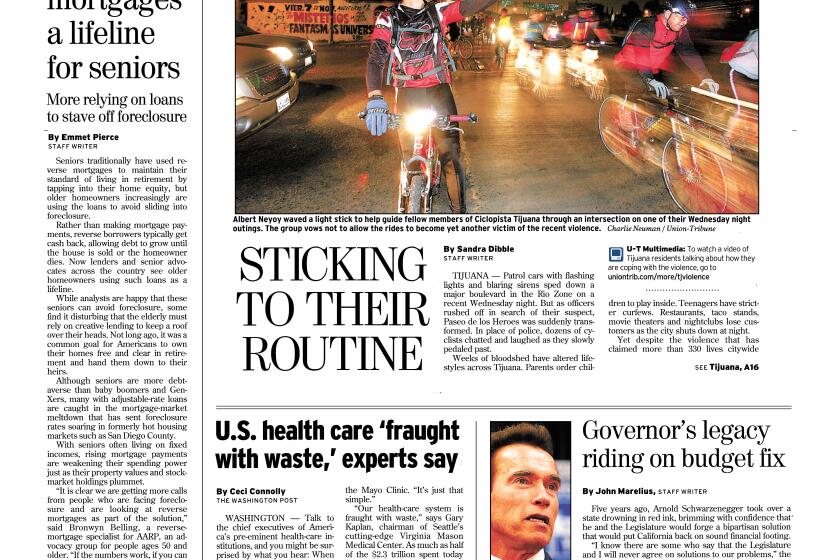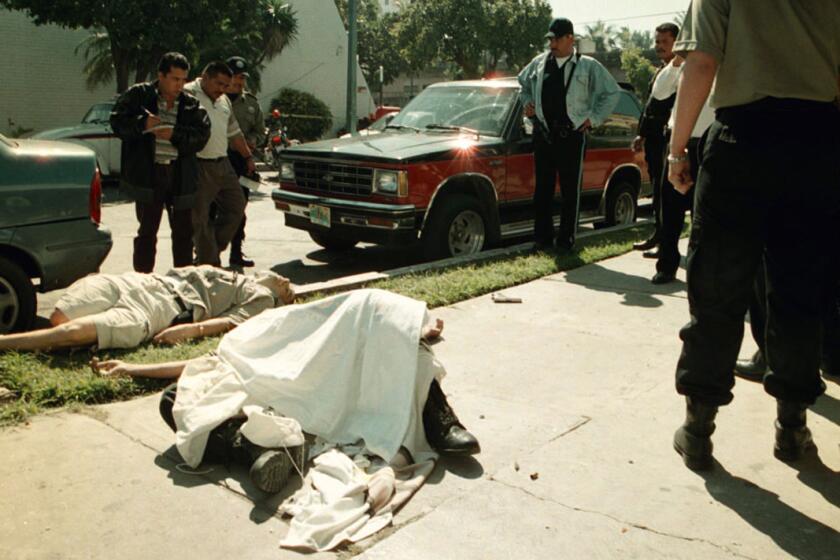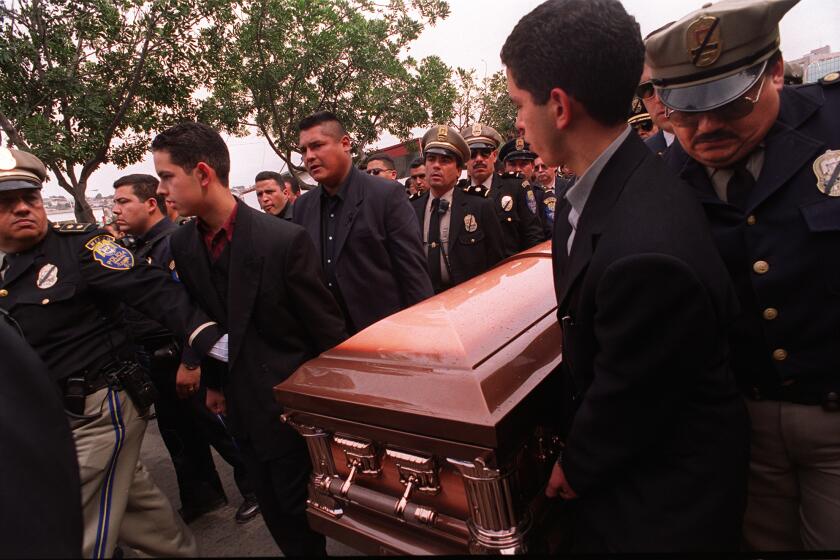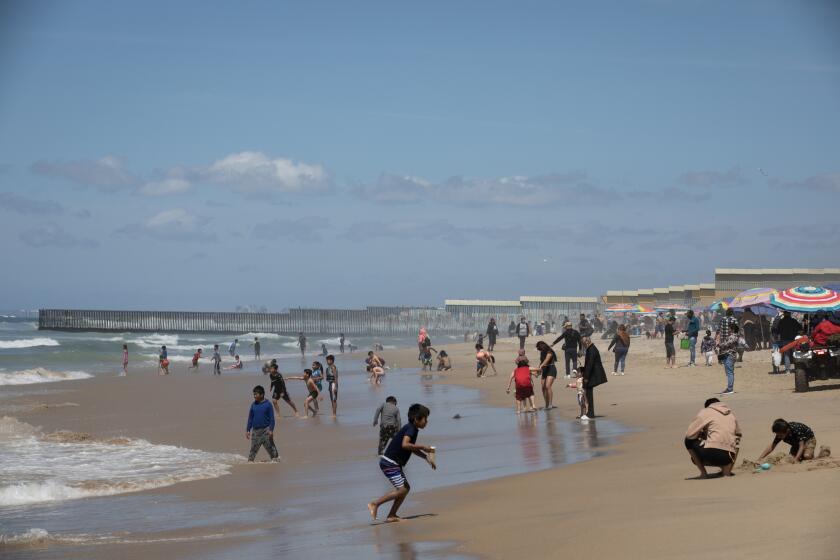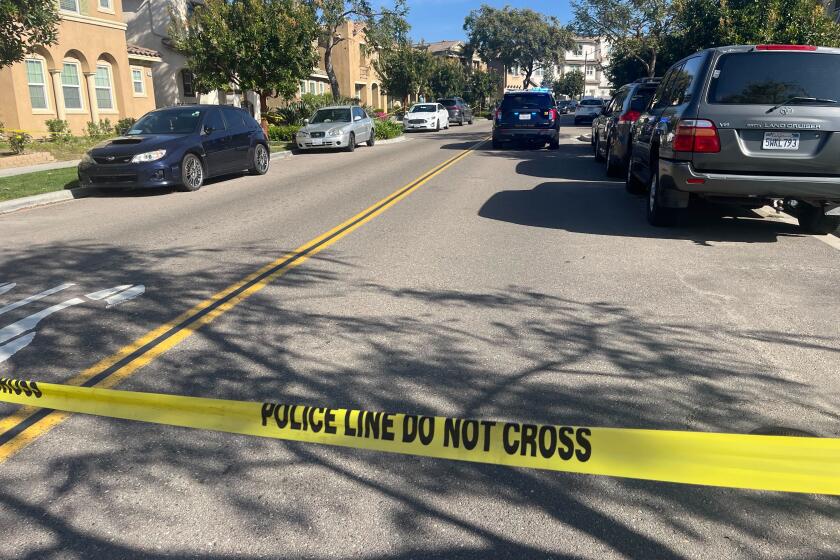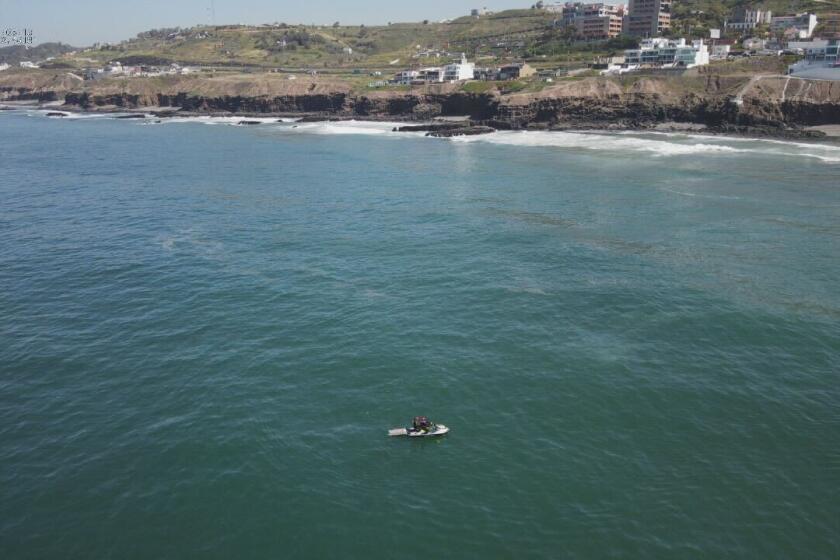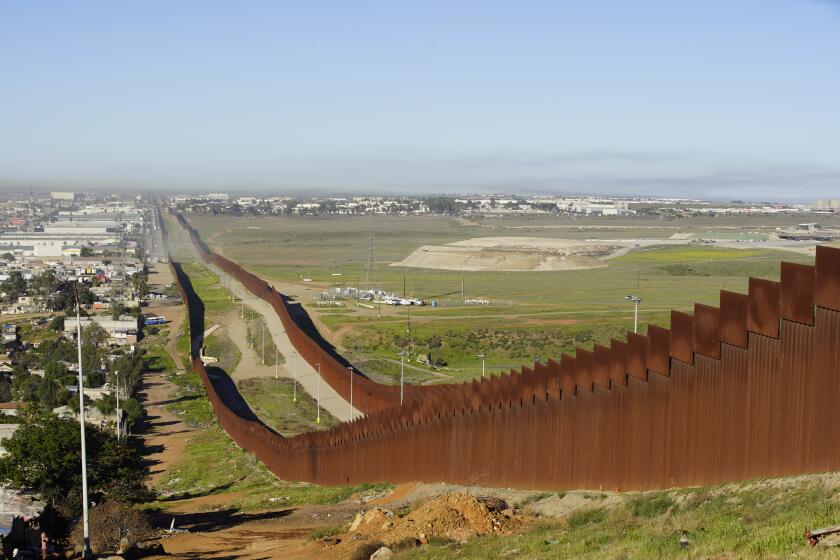Tough-talking former top cop wants to be Tijuana’s next mayor
Tijuana was enduring its darkest days when Julián Leyzaola Pérez rose to prominence in 2008 and 2009 as a tough-minded police chief who taunted drug traffickers, chased down criminals, even arrested his own officers—winning both ardent followers and vehement critics.
But earlier this month, the man who has survived repeated assassination attempts — he counts nine — seemed almost shy as an aide steered his wheelchair past the colorful, fragrant stalls of the city’s Mercado Hidalgo. On this sunny weekday morning, it was mother’s day in Mexico, and Leyzaola was busy passing out long-stemmed roses.
A year after an assailant’s bullets left him paralyzed from the waist down, Leyzaola is back in the public eye. But instead of chasing suspects, he’s pursuing votes — campaigning for mayor of Tijuana in the state’s June 5 elections.
“They took away my legs, and I can no longer fight with guns,” Leyzaola, 56, said in an interview at Mercado Hidalgo interrupted by admirers walking up to offer support. “But I can fight in a different way.”
By all accounts, it will be an uphill fight as he takes on candidates of the state’s well-entrenched political parties. Like most of Mexico, Baja California has been dominated by Mexico’s ruling Institutional Revolutionary Party, the PRI, and the National Action Party, the PAN. Independent analysts are not expecting an upset.
Leyzaola’s return has come at the invitation of Mexico’s Partido de Encuentro Social, a small party that has its origins in the Christian evangelical movement. Though not a member, he accepted their nomination, joining a field of 12 mayoral candidates, including two independents, who will be on the ballot.
Divided opinions
In Tijuana, many still remember Leyzaola for his efforts in bringing an increasingly chaotic situation under control. Violence skyrocketed, as federal troops moved in, drug trafficking groups engaged in a brutal battle for control of the region, headlines told of gruesome scenes of decapitated corpses, and bodies hung from highway overpasses. Police officers were gunned down, kidnappings rose, and Mexico’s military took the lead in law enforcement.
“We need 30 Leyzaolas ... to end corruption in Mexico,” said Dr. Jesús Ortíz Ampudia, a Tijuana orthopedic surgeon who led anti-crime protests in 2008. That was the year homicides reached a record high in the city, and members of the medical community became targets for extortion and kidnapping.
While Tijuana’s situation has improved since those years, “once again, we’re seeing crime rise because of the corruption,” said Ortíz, running for a city council seat on Leyzaola’s ticket.
On Friday night, at a popular Avenida Revolución nightclub, members of the largely working class crowd were split in their support. One who said he would vote for Leyzaola was a 46-year-old construction worker named Eduardo Ortíz. “His way of operating is perhaps a bit rough, but it’s what we need in Tijuana,” he said. “We need someone with firm goals, who can’t be corrupted.”
But others are not so admiring. At a recent news conference, Tijuana police officer Luis Hernández Gálvez recounted being beaten by Leyzaola. The officer was one of four arrested after being accused in March 2010 of extorting a Korean visitor, who was in the city to preside over an international Tae Kwon Do competition. Leyzaola “is a torturer, no doubt about that,” said Hernández, who has maintained his innocence and been reinstated in the department.
Leyzaola dismisses Hernández as a criminal in a police uniform, now working at the behest of the PRI. He denies ever torturing suspects, but human rights groups have cited credible evidence that Leyzaola knew about torture and abuse of authority carried out by his officers — and sometimes personally took part.
In the case of Hernández and his fellow officers, the Baja California Human Rights Commission in 2011 issued a report documenting numerous irregularities in their arrests and detentions, including beatings and torture, with Leyzaola’s direct participation. But, to date, no charges have been filed by the Baja California Attorney General’s Office.
Citing torture allegations, the city of Tijuana in 2014 banned Leyzaola from public office in Baja California for an eight-year period. But last year, the ban was reversed by a state magistrate, saying the accusers lacked proof.
Still, the allegations have had repercussions — making the department ineligible to receive U.S. funds for training and equipment that is available under the Merida Initiative, a partnership between the United States and Mexico to to fight organized crime while respecting human rights.
Under the rules, Tijuana can’t receive funds “until they show that they are indeed investigating and prosecuting the police agents involved in the multiple allegations of abuse,” said Maureen Meyer of the Washington Office on Latin America, a human rights advocacy group. “We haven’t seen any progress made here.”
Persuading reluctant voters
For all the buzz in political circles about this year’s mayoral race, changing Tijuana’s political status quo will mean persuading the city’s 1.27 million voters that they have a stake in who wins. In last June’s federal midterm, fewer than 3 out of 10 eligible Tijuana voters cast ballots.
Campaigning in a wheelchair can be difficult across Tijuana’s numerous colonias, where small houses perch precariously on steep hillsides and narrow canyons. Leyzaola must focus on wheelchair-accessible locations, traveling with police bodyguards inside a bulletproof Nissan Pathfinder to interviews, breakfast meetings, neighborhood gatherings, debates.
Being handicapped has given him insights, he said: “I’ve seen situations from both ends, as a government official and as a victim. I understand how powerless one can feel, how angry one can become.”
A neophyte who has never run for a political office, Leyzaola said his lack of experience is his asset, “because in politics, having experience means that you know how to steal, without them putting you in jail,” he said.
“He’s a hero, and people are looking for heroes,” said Juan Manuel Hernández, a longtime Tijuana business leader and columnist with the daily newspaper, Frontera. “But it’s one thing running the security in a city like Tijuana, and another to be to be mayor. To be a mayor, you really have to be a negotiator.”
Military formation
Born in Culiacan, Sinaloa, and raised in Mexicali, Leyzaola is the son and grandson of military officers. Leyzaola had his own military career, retiring at age 39 with the rank of lieutenant colonel. He found a second calling in civilian law enforcement.
He became director of Tijuana’s 2,000-member department in December 2007, and the next year was made secretary of public safety. He was not operating single-handedly but working in close collaboration with the Mexican military and with backing of civil authorities, including then-Mayor Jorge Ramos and Baja California’s former governor, Jose Guadalupe Osuna Millan. During his tenure, more than 600 officers were dropped from the force, and 43 lost their lives, some in the line of duty and others suspected of collaborating with drug traffickers.
“Leyzaola did an excellent job, but he was working under a very powerful umbrella,” said Hernández, the Frontera columnist.
When Leyzaola’s Tijuana job ended in 2010 with a change in mayoral administration, he briefly took a state job before being hired for the top public safety job in Ciudad Juárez, then considered the world’s most violent city, with more than 3,000 homicides. Again, homicides dropped during his tenure, which ended in 2013.
Filmmaker Charlie Minn became captivated by Leyzaola’s story, one he chronicled in the recently released documentary, “Mexico’s Bravest Man.”
“To be a police chief in Mexico, especially in a dangerous city, I would use three words — deep, dangerous, and complicated,” Minn said. “I don’t know if his past is going to help him or hurt him.”
The day that changed his life
Had he not been shot, and left paralyzed from the waist down, Leyzaola would probably never have decided to run for office. But May 8, 2015, was a day that changed his life.
Leyzaola was in Ciudad Juarez, unarmed, sitting in his car preparing to cross the border to El Paso, while his wife stepped out to exchange money. Leyzaola says a gunman told him he was delivering a message from the No. 2 Ciudad Juárez police official, and opened fire, shattering Leyzaola’s spine.
The official, Jesus Antonio Reyes Ramírez, has denied any connection to the crime, and prosecutors have said that two suspects claim to have been motivated by personal reasons. But Leyzaola continues to hold Reyes responsible for a crime that he says goes all the way up to Chihuahua’s PRI governor, César Duarte.
Leyzaola said he was still in recovery at a Mexico City hospital when a friend from his Tijuana days, a former city councilmember from the Partido de Encuentro Social named Luis Moreno, suggested he run for mayor.
Being police chief, working the streets, leading catching criminals — that was his passion. The shooting, “ended a part of my life that I loved very much,” Leyzaola said. “I am not one of those people who feels defeated,” he said. “As long as I have a bit of life, and can do something, I’m going to do it.”
sandra.dibble@sduniontribune.com
Get Essential San Diego, weekday mornings
Get top headlines from the Union-Tribune in your inbox weekday mornings, including top news, local, sports, business, entertainment and opinion.
You may occasionally receive promotional content from the San Diego Union-Tribune.

